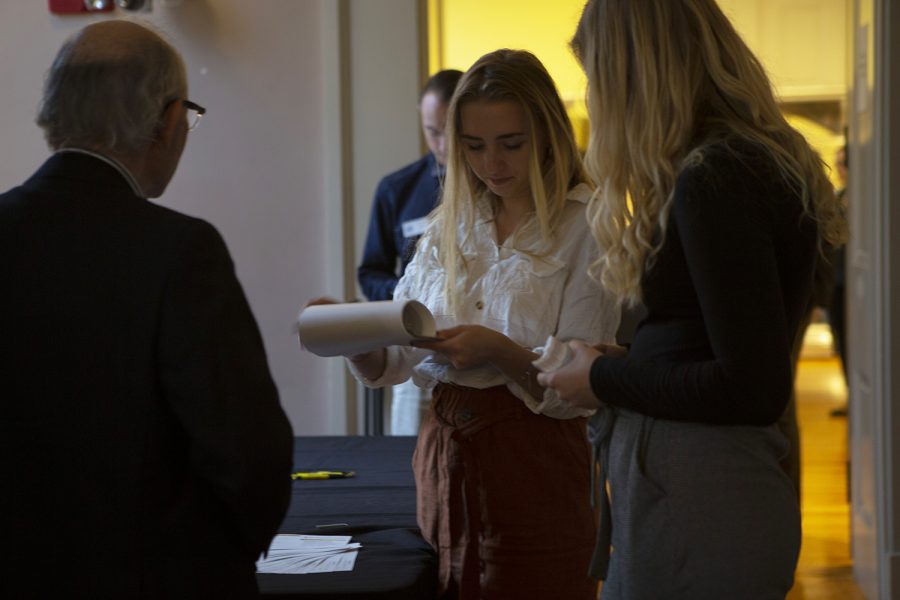Institute for International Business celebrates 20 years of connecting Iowans with the rest of the business world
Over the last 20 years, the Institute for International Business has brought the world of commerce closer together by creating links between Iowa and the global economy.
Colleagues check in for the 20 years of Tippie celebration held at the Old Capitol Building on Thursday, October 10, 2019.
October 11, 2019
While the Institute for International Business may have kept its same name for the past 20 years, its anniversary signals a versatile history.
Kenneth Brown, associate dean for the undergraduate program at the University of Iowa Tippie College of Business, said he has seen the Institute for International Business undergo a myriad of changes since its initial founding in 1999.
“The Institute for International Business is one of [Tippie’s] mechanisms for advancing us as a global and international organization,” Brown said.
Terry Boles, the institute’s previous director, said how it accomplishes this goal depends on who is running it.
William Albrecht founded the institute with an outward focus on international businesses, Boles said. Under Albrecht’s leadership, the institute focused its efforts on forming relationships with countries in Asia — for example, the institute’s main program in its early years was an M.B.A. in Hong Kong.
When Boles assumed the role of director, Tippie took over the Hong Kong M.B.A. program completely. Without this program, the institute needed to rebuild from scratch, Boles said. However, it lacked the funding to grow due to a lack of international focus in the business school at the time.
Boles and her team secured funds by writing the first two grants in the institute’s history — funding which led to new partnerships but also allowed for new undergraduate programs. Boles said the organization aimed to incorporate more international information into the curriculum.
As a world traveler, Boles said she saw the importance in expanding the worldview of the UI’s business students.
“It’s important to understand the norms and values of the people you’re doing trade with. There’s this assumption in America that our way is the right way, but it’s much more nuanced than that,” Boles said.
Toward the end of Bole’s time as director, the Institute for International Business created a course for the International Business Certificate, which funded overseas internships for undergraduate students.
More study abroad programs have developed at the institute under Dimy Doresca since he assumed the role of director in 2014.
RELATED: Mandela fellows land in Iowa City
“We provide international experiential learning to Iowa students where they travel overseas — to Belize, to the Dominican Republic, to Senegal — to roll up their sleeves and work side-by-side with international entrepreneurs,” Doresca said.
This face-to-face interaction is an integral aspect of the institute’s curriculum, Doresca said, and he works aggressively to ensure that students are equipped to be competitive in the global market post-graduation.
However, the Institute for International Business is not just focused on the benefits of Iowa residents, Doresca said. Through the Mandela Washington Fellowship program — founded by Doresca in 2016 — entrepreneurs from countries across Africa travel to the UI for six weeks.
During their visit, participants are trained in business and leadership, learn about local culture, share their own, and network with Iowa businesses.
Africa hosts many of the fastest-growing countries in the world, filled with young, energetic entrepreneurs, Doresca said. Therefore, he believes building connections with business and entrepreneurs in African countries benefits both parties, Doresca added.
“Because of the Institute for International Business, the name of the [UI] is in 34 countries now in Sub-Saharan Africa,” Doresca said. “We want to collaborate with more faculty here in the College of Business and across campus to capitalize on this name we have in Africa.”
In 20 years, the Institute for International Business has expanded the scope of its program, the limits of its classroom, and the limits of the world itself, Brown said.
“The IIB is just one way of saying that we need to know as an institution that our needs are best served by understanding, appreciating, and navigating the differences in culture,” Brown said.






